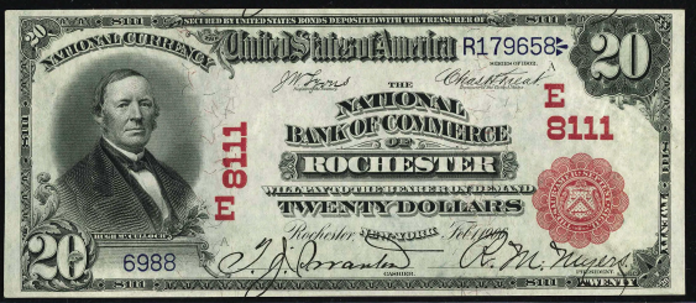Twenty Dollar Notes › Nationals › 1902 Twenty Dollar National Bank Notes › South Dakota Charters › 1902 $20 Bristol South Dakota First National Bank
Get Value Now
| Item | Info |
|---|---|
| Series | 1902 |
| Charter | #8480 First National Bank of Bristol, South Dakota |
| Year Chartered | 1906, 462 Banks Chartered |
| City Info | Bristol is a city located in western Day County, South Dakota, United States. It lies in Section 25 of Bristol Township, on the main line of what is now the BNSF Railway alongside U.S. Route 12. Similar to many towns of the area and to the Midwest in general, Bristol came into being as a result of railroad expansion. The railroad, which first came through the area in the 1870s, identified the site which would become Bristol as Station #70. C.P. Prior, a district railroad surveyor and townsite agent, was given credit for naming Bristol in 1881. He named the town after Bristol, England. Source: Wikipedia |
| Similar Cities | If your note doesn't match try: 1. Bristol, Pennsylvania - Farmers' National Bank of Bucks County 2. Bristol, Rhode Island - First National Bank 3. Bristol, Rhode Island - National Eagle Bank 4. Bristol, Tennessee - First National Bank 5. Bristol, Connecticut - Bristol National Bank 6. Bristol, Tennessee - First National Bank 7. Bristol, Virginia - Dominion National Bank 8. Bristol, New Hampshire - First National Bank 9. Bristol, Vermont - First National Bank 10. Bristol, South Dakota - Citizens National Bank |
| Seal Varieties | Red, Blue |
| See Also | If your note doesn't match try: 1. 1905 $20 Gold Certificate 2. 1906 $20 Gold Certificate |
| Other Info | 1. Value depends on notes known for charter, condition and market demand. |
| Neat Fact | Some issues contain regional geographic identifiers. N = New England. E = Eastern. M = Midwest. S = Southern. W = Western. P = Pacific. The letters were included for hand sorting purposes (Kelley, 5th Ed. P 5). |
No Obligations Offers and Appraisals
Please submit a good photo or scan. It will be identified and evaluated. Understand there may be subtle differences between the image you see above and your note. Signatures, design, markings and note condition will determine the offer price. Notes in Uncirculated or better condition receive the best offers.
Appraisals can be estimated for wholesale and retail prices. Wholesale is what dealers typically pay. Retail is what a collector might pay. Retail is slightly higher in most cases.
Please visit this page for USA Paper Money Reference. Do not treat this page as a reference guide, it is for appraisal and acquisition purposes only.
